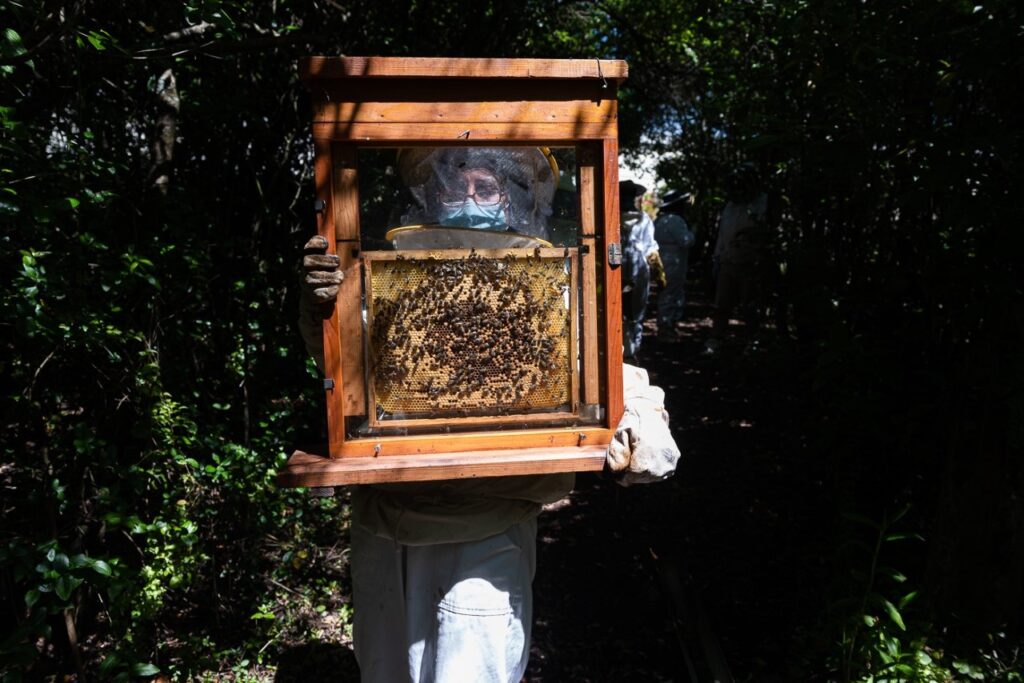Beekeeping in the Algarve is facing the second year of difficulties due to drought and rising production costs, but does not have any support from the Ministry of Agriculture, criticized the Sotavento Algarvio Beekeepers Association (Melgarbe).
Agência Lusa was with producers from the Algarve association, who said they were struggling with the mortality of their herds due to dry vegetation and lack of food in the field, a situation that adds to the increase in costs and production factors, such as diesel or the food that allows the formation of hives or their subsistence in times of food scarcity.
“This year, the forecasts are terrible, because we already had a dry year before and a lot of fleet was lost. This year, beekeepers tried to replace the fleet they lost and we caught up with a year that, at the moment, is between two months and two and a half months advanced. Therefore, we are going to have a much longer summer and the forecasts are that it will be worse than last year or much worse'”, said the president of Melgarbe, Manuel Francisco.
The producer in the Tavira area, in the Sotavento Algarve, regretted that there is no support for beekeeping, contrary to what happens with other agricultural sectors that received aid from official entities, and anticipated a year in which “expenses are increasingly and less and less production”, leading beekeepers “to experience more difficulties”.
According to the association leader, the flora, at the moment, is as dry as it is in most years at the end of August and the summer, "instead of three months, becomes five or six", affecting the viability of the hives and the production.
“The bee does not have nectar outside the hive because everything is dry, the bees do not reproduce and the fleet is eliminated by itself, because the life cycle ends and we arrive at the foot of the hives and they do not have bees due to the impossibility of the queen can reproduce new ones to replenish the number of bees for the hive to work”, he explained.
Paulo Ventura, who produces honey in the Odeleite area, in the municipality of Castro Marim, and is also a technician at Melgarbe, estimated that beekeepers will produce “about 30% of the production that there was last year”, which, "on average, it should not reach five kilos per hive".
The same source recalled that, last year, the summer “extended immensely” and this caused “a lot of hive mortality in autumn and winter”. Beekeepers tried to “replace their staff”, but “today, hives are already dying”.
The losses are between “20 to 30% of hives, in total”, because on the coast, where there is intensive agriculture, “every year more than half of the hives die” and “last year close to 70% died”, referred.
“Then we have another problem, having a Ministry of Agriculture that does not look at the beekeeping sector as a sector of economic and agricultural activity like the others”, he criticized.
Paulo Ventura argued that beekeepers are chaining "years in a row of problems, with hive mortality, extreme drought and climate change".
According to the official, the replacement of staff “is exhausting the budget of beekeepers in the Algarve”.
Melgarbe has about 300 associates, representing close to 70.000 to 72.000 hives, that is, 10% of the national workforce.
Paulo Ventura stated that beekeepers "never had anything from the Ministry [of Agriculture], similar to what happens with other activities", such as goats, sheep or cattle, and stressed that just setting up a hive costs about of 150 euros, to which are also added the costs of feeding the herd in times of scarcity.
“Portuguese beekeeping has never had support in this regard, never had serious and effective recognition from those who govern us and every day creates more problems and more difficulties for us to maintain these staff and meet the commitments we also have with the fruit growing sector”, stressed.
The producer recalled that it is the beekeepers in the Algarve who take hives to pollinate almond trees from Alentejo, avocados from Algarve or raspberries from Costa Vicentina.



















Comments